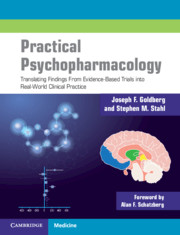 Practical Psychopharmacology
Practical Psychopharmacology from Part II - Targets of Pharmacotherapy
Published online by Cambridge University Press: 19 October 2021
Addictions are, fundamentally, disorders of the reward pathway. Clinicians, patients or family members are sometimes dissatisfied with the pronouncement that an addiction is its own diagnosis, preferring instead to search for additional psychiatric conditions (such as mood or anxiety disorders) from which addiction behaviors might be secondary offshoots – perhaps in part because of the more extensive range of pharmacotherapy options available to treat mood and anxiety disorders than addictions. True dual diagnoses certainly exist, in which mood or thinking problems occur as free-standing entities, but unless they chronologically antecede an addiction it becomes difficult if not impossible to discriminate them from the symptoms caused by repeated intoxication and withdrawal states. Still, intrinsic disorders of the reward pathway can be complex and often inherently involve problems with mood, thinking, perception, impulse control, self-regulation, compulsivity, and a host of psychopathology dimensions described in earlier chapters.
To save this book to your Kindle, first ensure [email protected] is added to your Approved Personal Document E-mail List under your Personal Document Settings on the Manage Your Content and Devices page of your Amazon account. Then enter the ‘name’ part of your Kindle email address below. Find out more about saving to your Kindle.
Note you can select to save to either the @free.kindle.com or @kindle.com variations. ‘@free.kindle.com’ emails are free but can only be saved to your device when it is connected to wi-fi. ‘@kindle.com’ emails can be delivered even when you are not connected to wi-fi, but note that service fees apply.
Find out more about the Kindle Personal Document Service.
To save content items to your account, please confirm that you agree to abide by our usage policies. If this is the first time you use this feature, you will be asked to authorise Cambridge Core to connect with your account. Find out more about saving content to Dropbox.
To save content items to your account, please confirm that you agree to abide by our usage policies. If this is the first time you use this feature, you will be asked to authorise Cambridge Core to connect with your account. Find out more about saving content to Google Drive.